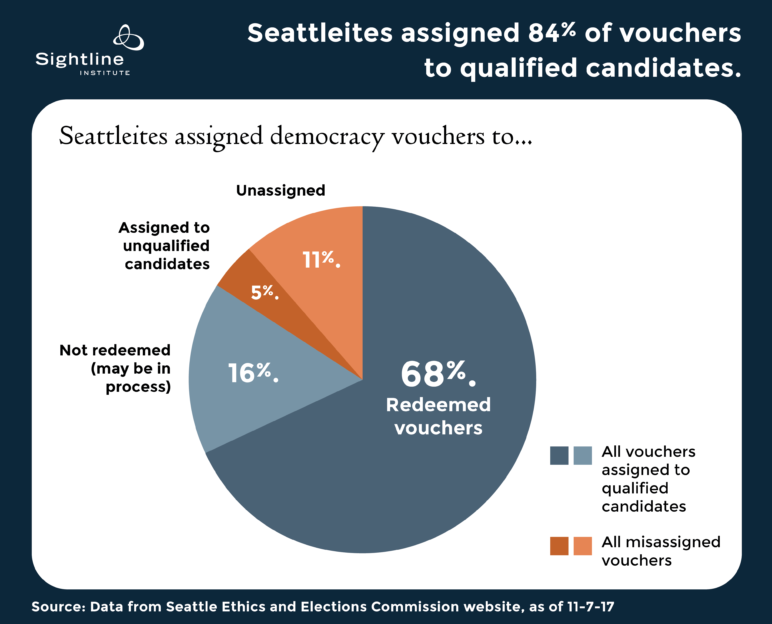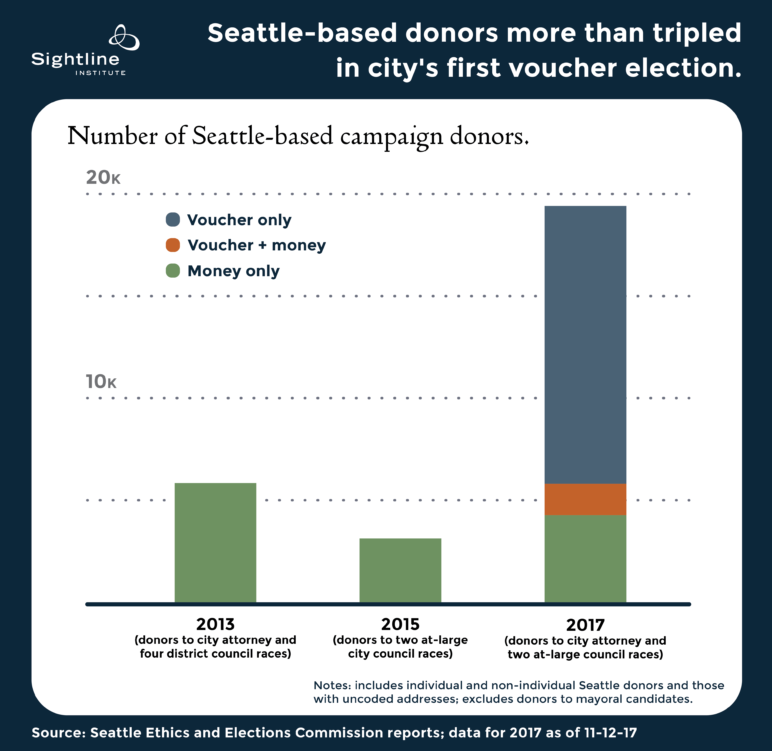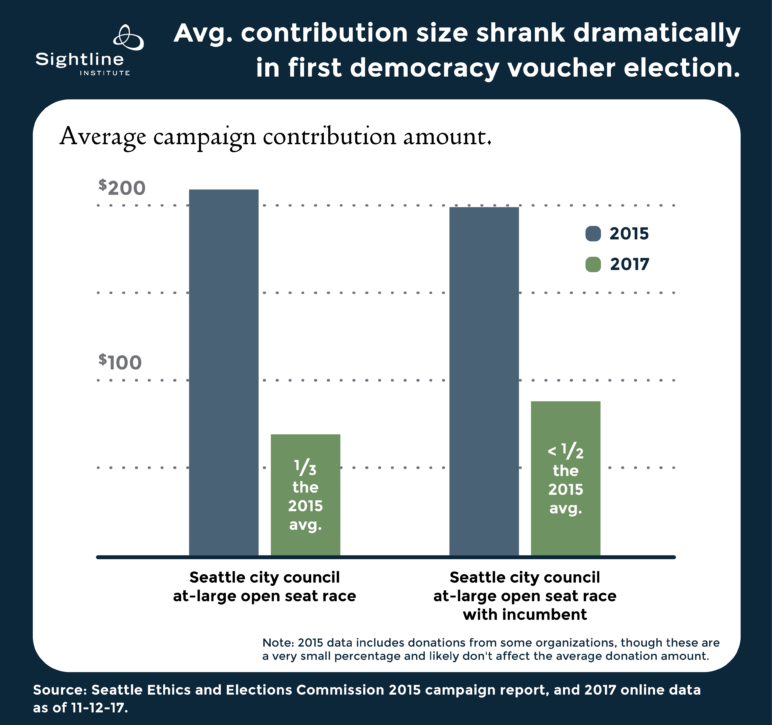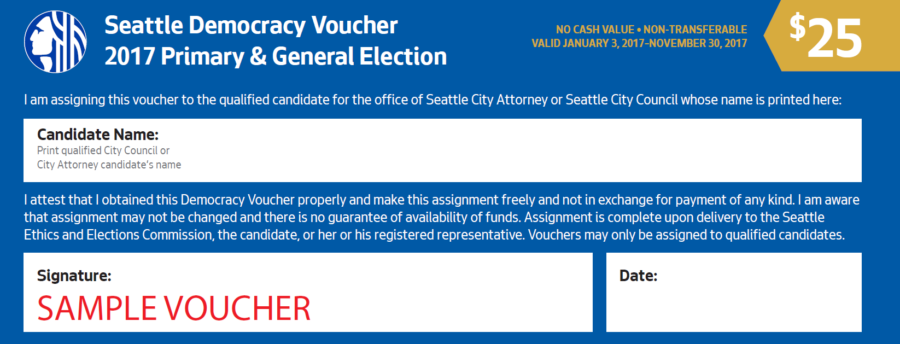When Seattleites adopted the democracy voucher program in 2015 they made a bold decision to become national leaders in campaign finance reform. Democracy vouchers had never been tried anywhere before. They were an exciting idea, but no one really knew how they would play out. On November 7th, the city closed its first ever election cycle using the new public financing model. And it’s clear: in just one election cycle, the program changed the campaign fundraising game for both candidates and donors.
As of November 16, nearly 71,000 vouchers had poured into the offices of the Seattle Ethics and Elections Commission (SEEC), the city bureau charged with running the program. They came from over 18,600 residents of the Emerald City, and they translated into $1.14 million in funds distributed to six candidates for city office this year.
The democracy voucher program gives each eligible campaign donor living in Seattle four $25 vouchers they can assign to candidates running for city office who have qualified for the program. To qualify to receive voucher dollars, candidates must agree to certain requirements, such as stricter contribution and spending limits. To refresh your memory on the ins and outs of the program, you can look back at our 2015 democracy voucher article series.
Candidates were able to rely much more on a broad base of small-dollar donors, loosening the choke hold wealthy donors have had on candidate’s purse strings.
This year candidates for three offices were eligible to join the program: the two at-large city council seats (numbers eight and nine), plus city attorney. Candidates for mayor couldn’t join the voucher program this year, though that office will become eligible for the program next go around, in 2021.
It’s hard to say how the democracy voucher program changed the outcomes of the city council and attorney races this year. What we can say is that an unprecedented number of Seattle adults were able to take part in the conversation of who should represent them by making contributions to their preferred candidates’ campaigns. What’s more, candidates were able to rely much more on a broad base of small-dollar donors, loosening the choke hold wealthy donors have had on candidate’s purse strings.
Did Seattleites understand the system?
By and large Seattleites understood the program. Of the 64,000 democracy vouchers the city received as of election day, 84 percent were for candidates who had qualified for the program (this percentage has increased since election day). That’s an astonishing rate considering the program’s newness and novelty and that in order to know which candidates have qualified to receive voucher money, Seattleites have to either look the information up on the SEEC website or have a conversation about the program with someone else who knows, such as a candidate or campaign volunteer. Seattle residents who sent in the other 16 percent of vouchers—the ones that couldn’t be accepted—tried to assign them to candidates who were not eligible (for example, because they did not complete the qualification process) or did not assign the voucher to any candidate at all.

Did Seattleites use their vouchers?
As of November 12, over 15,100 Seattle residents had made a campaign contribution with at least one voucher to a candidate for city council or attorney. These voucher donors made up nearly three-quarters of the total 19,414 Seattle residents and organizations that made donations to candidates in these three races.
By comparison, two years ago in the 2015 city election about 3,100 Seattle individuals and organizations gave financial contributions to candidates for either of the two at-large council seats. Four years ago, in the 2013 city election, just over 5,800 Seattle-based donors contributed to one of the city’s four at-large council races and the city attorney race.

Of the nearly 20,000 Seattle donors to city council and attorney candidates this year, approximately 16,100 were actual people, representing three percent of Seattle adults.
This total—three percent of all Seattle adults—may not sound like much. In fact, it sounds puny. But it blows past city and state giving rates out of the water: in each of the previous two city election cycles, fewer than one percent of Seattle adults gave to candidates for city office other than mayor (when you add in mayoral race contributors to the 2013 total, just 1.5 percent of Seattle adults made campaign contributions for city races that year). In Washington state, less than one-fifth of one percent of the voting age population makes contributions to candidates for governor or state legislature. In fact, the state with the highest rate of giving is Vermont, where 5.9 percent of the voting age population makes financial contributions to candidates for state office. In one campaign cycle Seattle cut Vermont’s lead in half, and Seattle’s voucher program didn’t even include the mayor’s race this year. In future years, participation is likely to be much higher. Watch out Vermont: Seattle is coming for you.
Donors were also more diverse
Not only did an unprecedented number of Seattle adults make campaign contributions this year, those donors were also more diverse compared with past donor pools or money donors to this year’s mayoral candidates. An analysis published by the Win/Win Network and Every Voice found that voucher donors are more geographically dispersed across the Seattle than typical campaign donors. They were also more likely to be under 35 years of age, and women compared with donors to this year’s mayoral candidates.
Did candidates use them?
As I mentioned above, candidates for three of the four city offices up for election this year could qualify for the program: the two at-large city council seats plus the city attorney seat. One of the two city attorney candidates enrolled in the program, and he funded over half of his campaign via $25 voucher donations.
All four of the city council candidates who made it to the general election took part in the program and funded between 66 and 85 percent of their campaigns with voucher dollars. In fact, in the competitive race for the open city council seat eight, both candidates who made it to the general—Jon Grant and Teresa Mosqueda—actually received the maximum amount of voucher donations possible under the program, $300,000.
Did vouchers change how candidates fundraise?
Not only did candidates rely heavily on the voucher program, the program also changed the fundraising game for candidates. Let’s compare donor pools for the two at-large city council races from this year with those of 2015. In both years one of the two races wasn’t very competitive as there was a strong incumbent. In 2015 that was seat eight; this year it was seat nine. The other race was for an open seat and much more competitive: in 2015 seat nine was open and this year seat eight was open. Though the race for the open seat in 2015 didn’t become quite as competitive as the race for this year’s open seat, the circumstances overall were not too different.
In 2015, a little over 3,000 individuals and organizations made contributions to the campaigns of the four candidates who made it to the general election for the two at-large city council seats. This year, over 14,000 people (as of November 12) have contributed so far to one of the final four campaigns for the these two seats: close to a 400 percent increase.
What’s more, the average donation size for each seat substantially decreased. In 2015, the average contribution size for the open at-large council seat was $209. This year, contributions for the open at-large council seat averaged $88 (including voucher donations), less than half of the 2015 average. Contributions for the less competitive at-large council seat in 2015 averaged $199; this year contributions to the less competitive at-large council race averaged just $69 (including vouchers), or one-third of the pre-voucher average. The reduction is due to two things. One is the overall reduction in contribution limits for all candidates that the Honest Elections Seattle initiative instituted. These contribution limits are even smaller for voucher program candidates. In addition, candidate’s reliance on a broad base of $25 voucher donors, rather than a smaller base of larger contribution donors, also contributed to dramatically reducing these numbers.

As of November 12, one week after election day, vouchers made up almost 60 percent of the contributions for city council seat eight and nearly three-quarters of the total contributions for seat nine.
And this is only the beginning…
In just one election cycle vouchers have changed campaign finance in the city of Seattle. Candidates are receiving smaller donations from much larger—unprecedentedly large—donor bases. Vouchers are motivating candidates to get out, talk to people, meet and make relationships with more of their constituents. More Seattleites than ever are participating in the campaign conversation through campaign contributions.
More Seattleites than ever are participating in the campaign conversation through campaign contributions.
When Seattleites approved the democracy voucher program in 2015, they committed to trying it out for 10 years, until 2025. Who knows what the city’s races will look like by 2025? Perhaps this year is only a glimpse of what is to come.
Note: The numbers in this article are from three dates: election day (November 7), November 12, and November 14, 2017. The numbers are slightly different as many donations come in or are recorded after election day. In each case, I’ve noted which date the data refers to. Vouchers and money donations will continue pouring into campaigns for the remainder of November, which will add to the numbers I reported here.
The Win/Win Network, in collaboration with national non-profit Every Voice, published their own analysis of this year’s voucher users, available here. The Seattle Ethics and Elections Commission will be publishing an additional in-depth data analysis of voucher use during the 2017 election cycle soon.
[list_signup_button button_text=”Like what you|apos;re reading? Get our latest democracy research here.” form_title=”Reclaiming Our Democracy” selected_lists='{“Reclaiming Our Democracy”:”Reclaiming Our Democracy”}’ align=”center”]


Comments are closed.